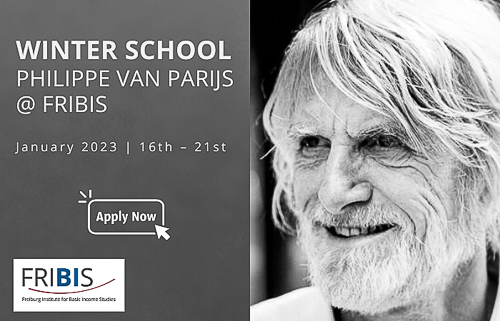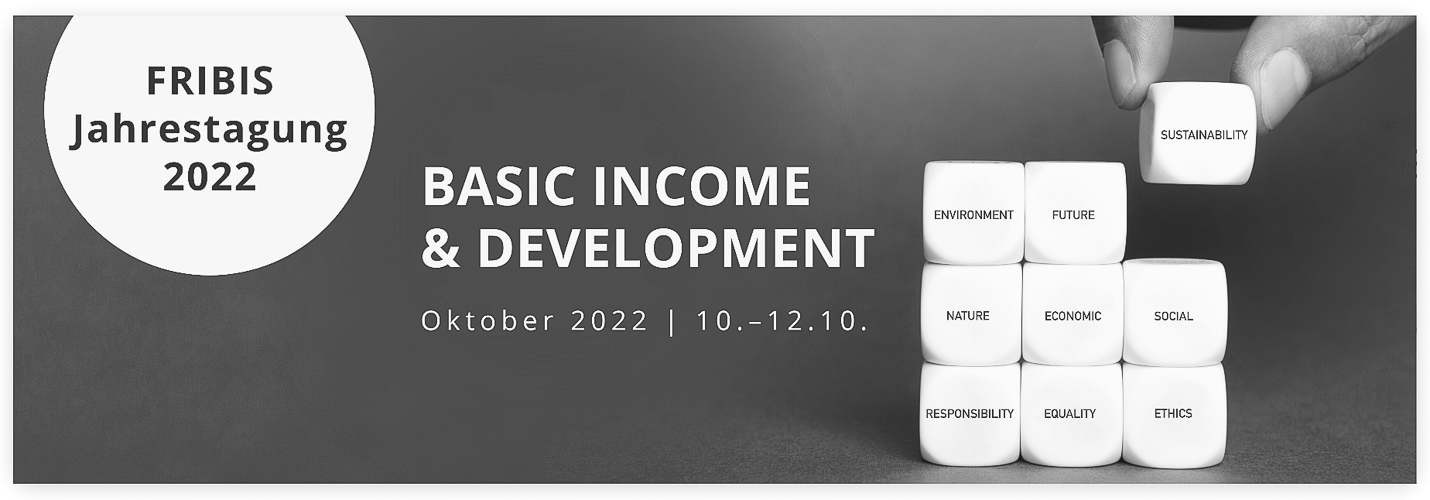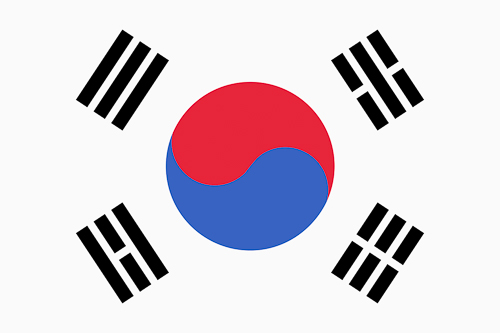
by Peter Knight | Nov 21, 2022 | Events, News
The Freiburg Institute for Basic Income Studies (FRIBIS) is inviting you to the first FRIBIS winter school, entitled “Today’s global challenges and the UBI debate”, and under the guidance of Philippe van Parijs, from January 16th to 20th 2023. Over the five days, the participants will focus on whether today’s big challenges, such as the climate crisis, the pandemic and international tensions and conflicts, put UBI on the back burner or provide grounds for its growth.
Read more and apply here.

by Peter Knight | Oct 4, 2022 | Events, News
Basic income has become the subject of a lively and controversial debate in politics, civil society and academia. By questioning the fundamental assumptions of our social interaction, it challenges us to redefine the way we want to live together. At Basic Income and Development, this year’s FRIBIS’ annual conference, we will be taking a closer look at the relationship between basic income and development ideas and the potential they hold for the challenges of both the present and the future.
For decades globalization and neoliberal economic policies have driven social and ecological crises worldwide. The ongoing climate change has not only lead to environmental disasters, but is also causing social crises. The increasing social and economic inequality is resulting in social polarization and increasing support for populist parties. And, as more and more public goods and services have been privatized in favour of economic growth, the risks in the wake of the various global crises have become collective problems. At the same time standards for the management of natural resources and the natural living environment are lacking, as are norms and values for labour markets, health policy and crisis prevention. We also lack sustainable means and mechanisms to establish social, ecological and economic justice.
Given these challenges, we want to explore the extent to which basic income can help to overcome crises and create new perspectives. Could a basic income help us to use environmental resources more sustainably, preserve biodiverse habitats and make social communities more resilient? Would it help people in (post-)conflict regions to build or secure social peace? Or would it rather have the opposite effect, as some critics suggest? What are the potentials and risks of a basic income for development practices in the Global South, and how does this/do they relate to concepts of redistribution and justice? These and other questions will be addressed at this year’s FRIBIS annual conference.
Visit the conference website here.

by Peter Knight | Aug 29, 2022 | News, Research
In August, 2022, a new book and a new report on UBI research in the UK were published.
The book is The macroeconomics of basic income by Zsófi Kőműves, Chris Thoung, and Jakub Zagdanski. It was published by Cambridge Trust for New Thinking in Economics and can be downloaded free here.
While there is growing work on the small-scale (micro) impacts of basic income on people and households, there is much less that considers how such policies might affect an entire economy. This new research by Cambridge Econometrics looks more closely at the economy-wide (macroeconomic) effects of basic income as it might operate in the UK.
A new report, ‘Technological change and growth regimes: Assessing the case for universal basic income (UBI) in an era of declining labour shares’, has been published by the University of Bath Institute for Policy Research (IPR).
The report, co-authored by Joe Chrisp, Aida Garcia-Lazaro and Nick Pearce, supported by funding from Geoff Crocker, examines to what extent the role of technological change is responsible for a decline in the labour share, and discusses the likely effects, and political feasibility, of policy solutions such as universal basic income (UBI).
Cambridge Econometrics’ mission is to provide clear and useful insights, based on rigorous and
independent economic analysis, to address the complex challenges facing society.
www.camecon.com
Cambridge Econometrics Limited is owned by a charitable body,
the Cambridge Trust for New Thinking in Economics.
www.neweconomicthinking.org
Contact person: Chris Thoung (ct@camecon.com)
Authors: Zsófi Kőműves (zsk@camecon.com)
Chris Thoung
Jakub Zagdanski

by Diana Bashur | Jul 24, 2022 | News
Ahead of BIEN’s General Assembly scheduled for 28 September (online), we have the pleasure of announcing two posts in BIEN’s Executive Committee, which we invite you to run for. These posts are a Volunteer Coordinator and a Fundraising Coordinator.
In terms of responsibilities, the Volunteer Coordinator‘s tasks will include: – Screening inquiries from interested volunteers and referring them to the appropriate project lead – Assigning volunteers specific tasks depending on BIEN’s needs – Regular participation in and reporting to BIEN’s monthly Executive Committee meeting. Our outgoing Volunteer Coordinator will be available to train and support whomever next steps into this role.
BIEN is currently at a critical juncture where it has secured funding from Mustardseed Trust for its growth for three years and aims to further expand its funding sources. The Fundraising Coordinator is a newly created position to this effect. His/her tasks will include: – Developing a fundraising strategy – Reaching out to potential donor organisations and individuals to develop a funding stream. This task will be shared with BIEN’s Hubs Coordinator. – Regular participation in and reporting to BIEN’s monthly Executive Committee meeting.
To apply, please write to me directly with: – your CV – a personal statement (a minimum of 200 and a maximum of 500 words). The personal statement should mention why you would like to be elected to a specific post, your qualifications and experience relevant to the post as well as ideas you have about filling it. – and a profile picture
Please contact me with your intention to run by 19 August. Earlier submission is encouraged.
The two posts will be filled through an election at BIEN’s General Assembly, which you can already register for by clicking here.
As an incumbent, you will be joining BIEN’s Executive Committee, a group of 12 individuals dedicated to Basic Income in these exciting times for this policy tool.
We very much thank you should you consider running for either of these posts. I am of course happy to answer any questions.

by Guy Standing | Jan 18, 2022 | Featured, Opinion
There are rare moments when a combination of threatening circumstances leads to a wonderful transformation that only a short time before would have been unimaginable. This year may be such a moment. The Republic of Korea could set an example to the world that would bring happiness to millions of Koreans, and to many more around the world.
The risks if politicians are too cautious are enormous. Before COVID-19, the global economy was already heading towards a crisis. For over three decades, more and more of the income and wealth were going to the owners of property, financial, physical, and “intellectual”. The commons, belonging to everybody, were being converted into the source of profits and rents. A new class, the precariat, was growing everywhere, suffering from multiple forms of insecurity, drifting deeper into debt. It was incredibly high debt – private, corporate, and public – that made the global economy uniquely fragile.
Meanwhile, the public across the world were realizing the threat posed by global warming and destruction of the environment. Nothing was being done. If that continues, life for our children and grandchildren will be impaired. And it is clear that mistreatment of nature has helped make this an era of pandemics. The COVID-19 outbreak is the sixth pandemic this century.
In these circumstances, policies that merely try to go back to the old normal will not work. We need a bold transformative vision, one of courage, one designed to give people basic economic and social security, one designed to make the economy work for society and every citizen, not just for the bankers and plutocracy, and one designed to revive the commons and our natural environment.
Jae-Myung Lee is campaigning for the Presidency in the March 2022 presidential election with an exciting and feasible strategy, based on a promise of a basic income for every Korean man and woman, paid equally, as a right, without conditions. It is affordable. What is important at this stage is not to set some ideal amount, but to be on the road towards living in a society in which everybody has enough on which to survive, even if they experience personal setbacks.
What makes the proposal for a basic income so profound is that Jae-Myung Lee has come from a humble background, knowing poverty and insecurity from his childhood. He understands two fundamentals. First, the income of every Korean is due to the efforts of all those Koreans who lived beforehand, and it is based on the commons, nature and resources that make up the country, which belong to all Koreans. Those who have gained from taking the commons, most of all, the land, owe it to all Koreans to share some of the gains. A modest Land Value Tax, or levy, is justifiable and fair, and should help fund the basic income.
He also understands that pollution and global warming must be combated by a carbon tax or eco-taxes. The rich cause more pollution than the poor, the poor experience the bad effects more than the rich, including bad health from exposure to poisonous air. So, the solution must include carbon taxes to discourage global warming and polluting activities. But by themselves such taxes would hit the poor harder, because the tax would amount to more of their income.
The only sensible solution is to guarantee that the revenue from eco-taxes will be recycled through a Commons Capital Fund to help pay for the basic income, as Carbon Dividends. The poor will gain, while society will be on the road to fighting global warming and ecological decay. A basic income will also encourage more care work and ecological work, rather than resource-depleting labor. It will stimulate the desirable form of economic growth.
The second fundamental Jae-Myung Lee and his advisers have understood is that basic security is essential for rational decision-making and mental health. There cannot be individual or societal resilience against pandemics or economic crises unless there is basic security, so that people can behave rationally rather than in desperation. Experiments have shown that a basic income improves mental health and the ability to make better decisions, for oneself, one’s family, and one’s community.
In the Korean edition of my book Plunder of the Commons, I paid respect to the ancient Korean ethos of hongik ingan, which helped found Korea in 2,333 BC. It expresses a historically-grounded wisdom that Koreans should be re-teaching the world in an era of self-centered individualism and consumption-driven “success”. It conveys the sense of not just sharing in benefits of production but sharing in the preservation and reproduction of a sense of community, our sense of participation and our relationships in and with nature. A basic income would pay respect to that ethos. Jae-Myung Lee should be commended for having pioneered it in Gyeonggi Province, and would set the country on a new progressive road if elected President on March 9.
——
A Korean translation of this article was published by Pressian – a political news website headquartered in Seoul, South Korea.






